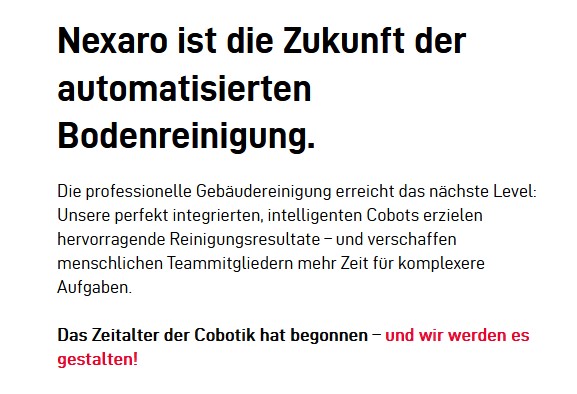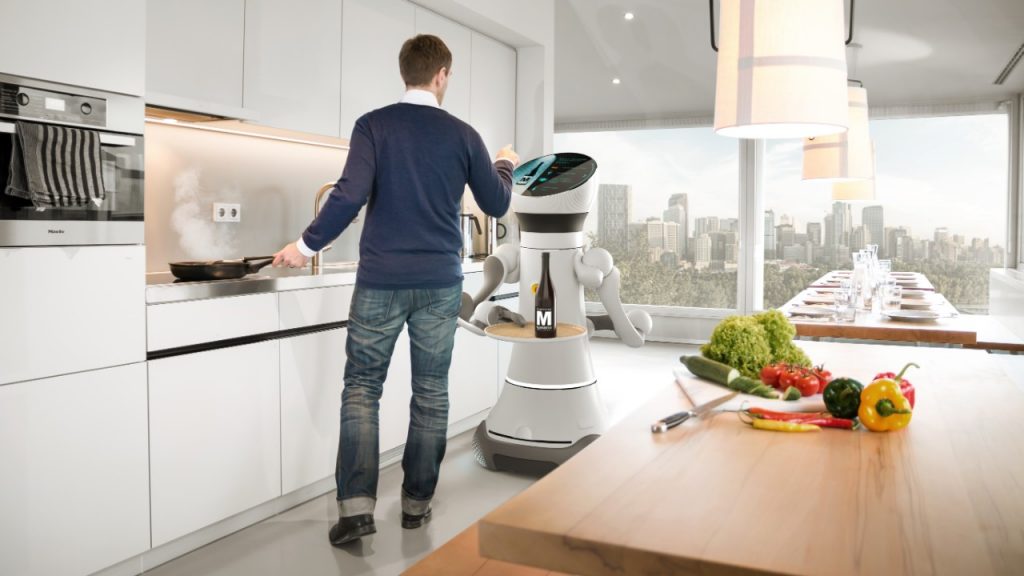Vorwerk pushes into robotics
The Wuppertal-based company Vorwerk continues to benefit from the Thermomix boom (photo above - Vorwerk press photo). The company relied on digitalization in good time and was able to sell more than 1.5 million units of the expensive appliances for the first time in 2021 (price will soon be around 1,500 euros). The Thermomix recently accounted for half of the annual sales of €3.4 billion. Despite the high sales volume, waiting times for it are increasing. With the exception of consumer electronics, no electrical product in this price range is likely to be sold in such high volumes. In the shadow of Thermomix, Kobold vacuum cleaners grew even more strongly. However, their total sales of EUR 0.8 billion were significantly lower than those of the food processor. The Kobold VR300 vacuum robot independently navigates through the entire apartment and cleans hard floors and carpets in logical paths. No-go areas can also be defined via app. All features that are also important in professional robotics or for other household applications. The Kobold division therefore benefits greatly from robotics, which brings us back to the topic at hand.
Neato Robotics
In 2010, Vorwerk acquired a stake in the US company Neato Robotics, founded in 2005 and based in Silicon Valley. Neato Robotics was an early developer of vacuum cleaner robots that were technologically sophisticated. In 2017, Vorwerk acquired the remaining shares. Neato Robotics' business performance recently fell short of expectations - partly due to Corona - but the technology is likely to have been incorporated into the Kobold VR 300. A comparison of the Kobold with the Neato suggests this(link). Therefore, the acquisition was probably successful in the end and whetted the appetite for more.
Nexaro Industrial Automation
Vorwerk also owns Nexaro. On Linkedin, the brand presents itself as "The future of automated professional floor cleaning". Brand because the corresponding website lists "Vorwerk Professionell GmbH" in the imprint. It is astonishing that Nexaro counts only 9 employees on Linkedin. Of these, none is a robotics or software engineer.

Nevertheless, Nexaro apparently announced its first robot at the "Interclean" industry trade show held in the Netherlands in mid-May. Unfortunately, there are no photos or videos. Possibly the robot was not ready in time (supply chains?). In the run-up, it was advertised confidently to revolutionary ("No time for the uproar at the booth?").
Is that the only way "Cobot" is used?
Associated with Nexaro are the words "cobot" (see above) and "cobotics". The question here is whether this is the use of hyped words, whether strong interaction with humans may be possible here, or whether this is just the beginning. In this Google ad, "Cobotic" is also advertised...:

Vorwerk wants more and is fast
A few months after the start of the pandemic, Vorwerk applied for a patent for disinfection robots. So it was no longer a matter of pure cleaning. The rapid response to the pandemic confirms what is already known: The Group observes market opportunities very closely and then acts quickly.
Fraunhofer care-o-bot could be distributed by Vorwerk
It is not surprising that a company like Vorwerk, which wants to make household chores easier by means of technologies, focuses on robotics on its own website. For example, the assistance robot developed by the Fraunhofer Institute for Manufacturing Engineering and Automation IPA was presented. According to the website, compared to the Pepper (now owned by United Robotics Group), this one would have the added value of being actively involved. The last known version of the project, which began in 1998, dates from 2015, but the robot continues to be developed unchanged.

automatica - why didn't Vorwerk want to show the Thermomix?
My former professor, who also happened to advise Vorwerk, taught us to watch out for weak signals. And: Facts can be evaluated differently. This is one of them: At the upcoming automatica trade fair, Neura Robotics will show the prototype of a household robot, according to Wirtschaftswoche. Neura Robotics, provider of the world's first cognitive robot, is known to be one of the favorites when it comes to opening up household robotics in a few years. At automatica, according to an insider, a robot is expected to operate a food processor on its own and cook for trade show guests. With this in mind, Vorwerk was asked if a Themomix could be used. Surprisingly, the Wuppertal-based company did not want Neura Robotics to cook with the Thermomix. Neura Robotics is now apparently using a different food processor. As surprising as Vorwerk's decision to forego free advertising was, its own robotics program for the household could be the explanation.

Household robots from Vorwerk would be good for the industry
If Vorwerk were to leave the ground and turn to upright robotics, it would most likely be in the home. This would be beneficial for the future market of household robotics. After all, this market is so large that there would be room for all of them for years to come. In addition, the new industry would be "taken seriously" more quickly. Household robots would be perceived as helpers and not as tech gadgets. Robotics companies like Neura Robotics or the United Robotics Group may produce good products. But they are quite unknown in private households. It would therefore be easier to roll out if a well-known company with a high level of trust were to take on the new technology. The product would require less explanation. Moreover, Vorwerk does not buy market share by means of low prices, as many a cobot manufacturer has tried to do.
By the way, the kitchen machines themselves are the best proof of how big the market is: After Thermomix, Bosch and Lidl each entered the market with large quantities. Nevertheless, market saturation is not in sight.
Addendum (06.06.22): A reader has pointed out that Vorwerk also has a stake in the cooking robot supplier Aitme.
Conclusion
Ultimately, some questions arise: Where does the know-how come from and does it stay with floor cleaning, and if so, why does Nexaro (see screenshot above) refer to "cobots". Definitely, we can assume that an extremely profitable corporation like Vorwerk, which owes its success to tech devices and has a global presence, closely follows all promising developments. These include Samsung's studies on household robots. In the field of floor cleaning, Vorwerk is already active in both the private and professional sectors. The next logical step would therefore seem to be assistance robotics for households - albeit perhaps at a later date. Vorwerk has access to well-to-do households and is likely to have perfected series production. Both would be good prerequisites for entering this huge market. The rest - the technology - can be bought in if necessary. Be it through research contracts (e.g., Fraunhofer) or through startup investments. One thing is certain: robotics is becoming increasingly important for Vorwerk.

